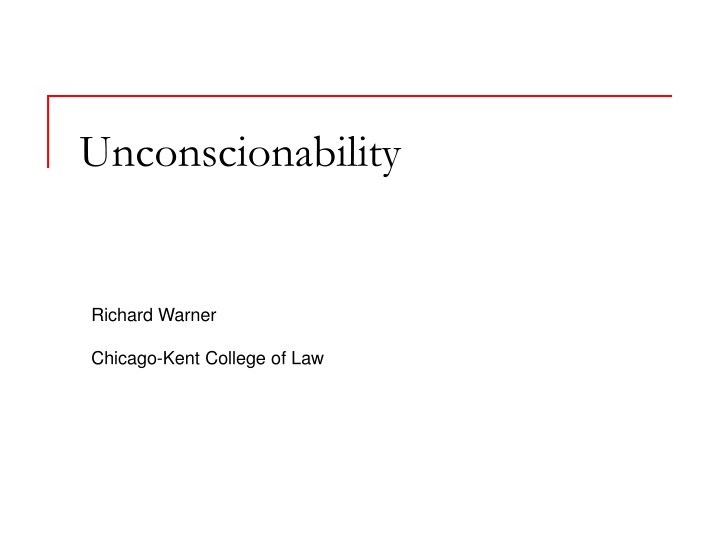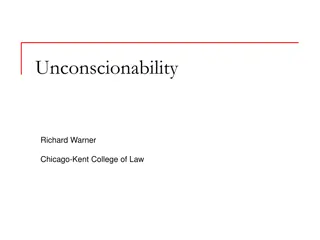
Unconscionability in Contracts and Warranty Disclaimers
Explore the concept of unconscionability in contracts, illustrated through the case of Henningsen v. Bloomfield Motors, and the importance of warranty disclaimers in limiting liability. Learn how the doctrine of unconscionability can render certain contract terms unenforceable based on procedural and substantive unfairness.
Download Presentation

Please find below an Image/Link to download the presentation.
The content on the website is provided AS IS for your information and personal use only. It may not be sold, licensed, or shared on other websites without obtaining consent from the author. If you encounter any issues during the download, it is possible that the publisher has removed the file from their server.
You are allowed to download the files provided on this website for personal or commercial use, subject to the condition that they are used lawfully. All files are the property of their respective owners.
The content on the website is provided AS IS for your information and personal use only. It may not be sold, licensed, or shared on other websites without obtaining consent from the author.
E N D
Presentation Transcript
Unconscionability Richard Warner Chicago-Kent College of Law
Lack of meaningful choice? Yes No Serious improper threat? Yes Doctrines do not apply No Duress Undue influence? Yes No Undue influence Substantively unfair? Yes No Unconscionable Violates public policy? Yes No No public policy argument Unenforceable Lack of meaningful choice + substantive unfairness = unconscionability
The Doctrine A term (or an entire contract) is unenforceable if Procedural unconscionability: there was a lack of meaningful choice in the formation of the contract, and Substantive unconscionability: the term (or contact) is substantively unfair.
Henningsen v. Bloomfield Motors A couple bought a car and then the steering went out after 468 miles injuring Mrs. Henningsen. Suppose that all the contract said was "Sold, one car for $2000". Could Mrs. Henningsen recover for breach of warranty? Yes, the car is a good, and the UCC implies a warranty of merchantability--that the car will be fit for the purpose for which it is ordinarily used. The car clearly was not fit for this.
The Disclaimer of Liability The contract in Henningsen limited the manufacturer's liability. It in part that the manufacturer would not be liable personal, the type of injury sustained by Mrs. Henningsen. There is no general rule that says you cannot disclaim warranties. You can. But there limitations. Unconscionability doctrine is one of them.
The Clause in Henningsen 7. It is expressly agreed that there are no warranties, express or implied, made by either the dealer or the manufacturer on the motor vehicle, chassis, or parts furnished hereunder except as follows: The manufacturer warrants each new motor vehicle (including original equipment placed thereon by the manufacturer except tires), chassis or parts manufactured by it to be free from defects in material or workmanship under normal use and service. Its obligation under this warranty being limited to making good at its factory any part or parts thereof which shall, within ninety (90) days after delivery of such vehicle to the original purchaser or before such vehicle has been driven 4,000 miles, whichever event shall first occur, be returned to it with transportation charges prepaid and which its examination shall disclose to its satisfaction to have been thus defective; this warranty being expressly in lieu of all other warranties expressed or implied, and all other obligations or liabilities on its part, and it neither assumes nor authorizes any other person to assume for it any other liability in connection with the sale of its vehicles.
Review The Doctrine A term (or an entire contract) is unenforceable if there was a lack of meaningful choice in the formation of the contract, and the term (or contact) is substantively unfair.
Unconscionability in Henningsen Was there was a lack of meaningful choice in the formation of the contract? The court notes: A standard form, no negotiation contract with gross inequality in bargaining power. The Henningsen s did not read the clause. No one drew their attention to it or referred to it. It was printed in small print on the back of the contract. All new car dealers used the same contract, so they could not go elsewhere to get better terms.
Unfairness Is the clause substantively unfair? The court notes: The lawmakers did not authorize the automobile manufacturer to use its grossly disproportionate bargaining power to relieve itself from liability and to impose on the ordinary buyer, who in effect has no real freedom of choice, the grave danger of injury to himself and others that attends the sale of such a dangerous instrumentality as a defectively made automobile. In short, it is unfair to disclaim liability for personal injury.
How Much Protection? The rule limits the enforceability of the clauses, and that provides some protection if a dispute goes to court. But what about consumers entering contracts? How do they know that the terms are fair?


